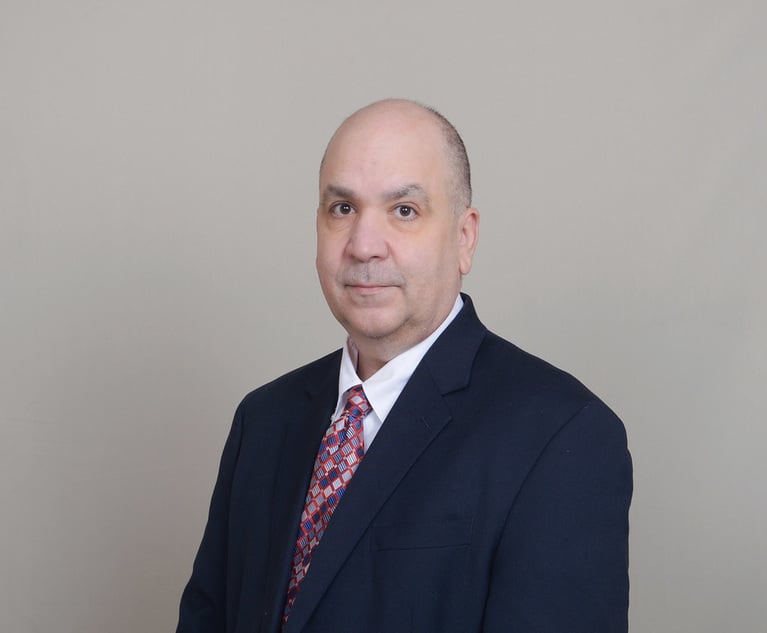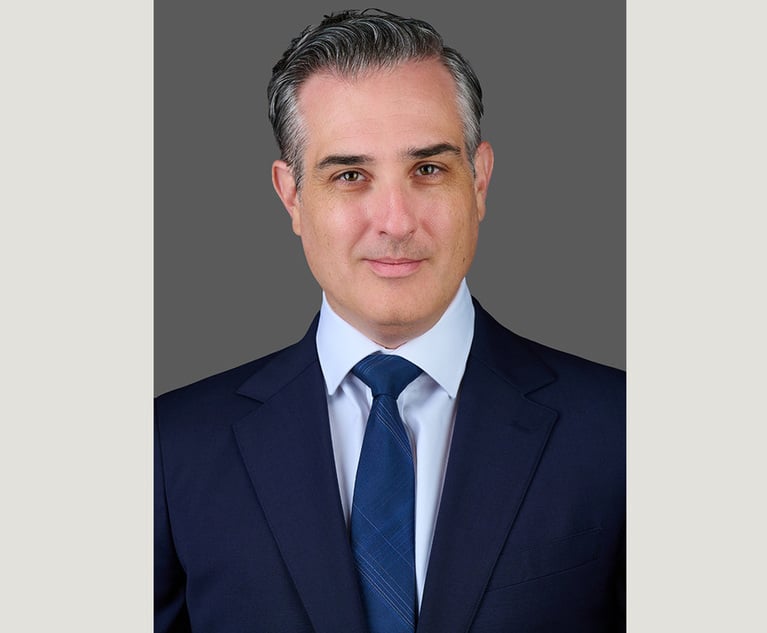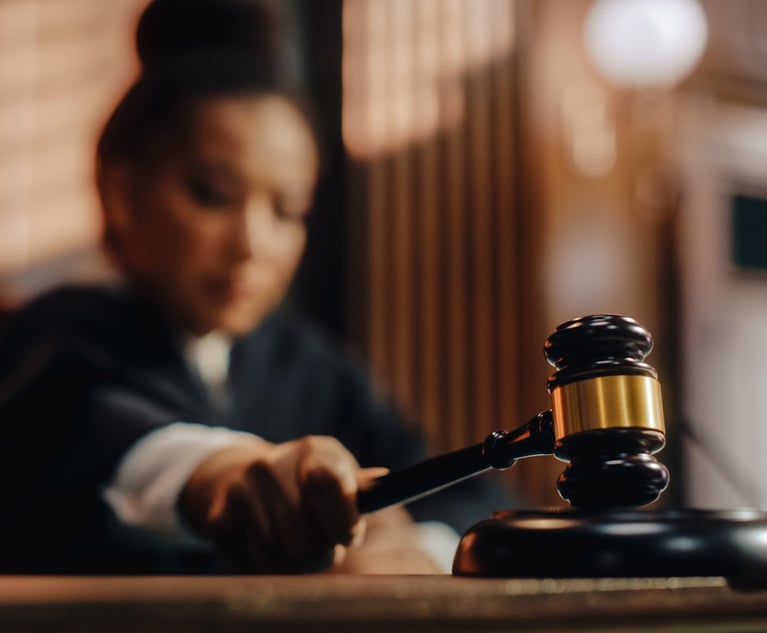What the Defense Bar's Post-'Tincher' Jury Charges Mean for Practitioners
The products liability landscape in Pennsylvania following the Supreme Court's game-changing decision in Tincher v. Omega Flex has often been referred to as the "Wild West" by practitioners, and the practice may just have gotten a little wilder.
October 13, 2017 at 06:26 PM
6 minute read

The products liability landscape in Pennsylvania following the Supreme Court's game-changing decision in Tincher v. Omega Flex has often been referred to as the “Wild West” by practitioners, and the practice may just have gotten a little wilder.
Last week, the Pennsylvania Defense Institute issued a set of suggested jury instructions outlining how judges should charge juries presiding over products liability cases. The new set of jury charges come more than a year after the Pennsylvania Bar Institute issued its own set of recommended jury instructions, which the defense bar has argued greatly favor plaintiffs and mischaracterizes the law.
The defense bar's instructions outline 16 suggested jury charges that deviate from the PBI's recommendations. The changes include adding the words “unreasonably dangerous” into the jury charge, removing language indicating a product is dangerous if it lacks any element necessary to make it safe, and adding language about the risk of the product being “unknowable.” The instructions also change charges involving crashworthiness and adds language regarding industry standards.
The instructions include lengthy sections detailing the rationale and case law behind each suggested jury charge.
“We want practitioners to submit these to the courts to say, as an alternative, here are our suggested jury instructions because we don't believe the Pennsylvania Bar Institute's instructions accurately reflect Tincher,” Ricci Tyrrell Johnson & Grey attorney Bill Ricci, who helped author the PDI's recommended instructions, said.
Ricci noted that the group intends to treat its recommended instructions as a “breathing, living” document that will be updated online based on suggestions from the bench and bar.
Muddy Waters
The Supreme Court's November 2014 ruling in Tincher overruled the nearly 40-year-old case that established a strict separation between negligence and strict liability principals. Since then, the plaintiffs and defense bars have disputed the extent to which Tincher overruled the prior case law, with jury instructions and the inclusion of industry standards being two focal points in the debate.
An article that Ricci and C. Scott Toomey of Littleton Park Joyce Ughetta & Kelly wrote that accompanied the defense bar's recently released recommended jury instructions said the new charges were necessary after the PBI refused to revise its recommended jury instructions, which the defense bar contends adds in language determined in Tincher to be specifically off limits. The article says that “at every turn, the Bar Institute's departures from Tincher attempt to influence the development of Pennsylvania law in a one-sided fashion beneficial only to the plaintiffs.”
However, plaintiffs attorneys are in sharp disagreement with that.
According to Galfand Berger attorney Richard Jurewicz, who represents plaintiffs, the defense bar's recommendations presume Tincher overruled more case law than it did, and are a “blatant attempt by the defense bar to re-write Tincher.”
“People read too much into this Tincher opinion. Its holding is quite narrow,” Jurewicz said. “If [the Supreme Court] were truly dissatisfied with the body of law, they would have overruled a number of these other Pennsylvania Supreme Court cases.”
Jurewicz said he believes the defense bar's jury instructions will further complicate an already muddied situation, with the more conservative judges favoring the defense bar's instructions, the more liberal judges following the PBI's recommendations and those who don't practice often before that particular judge left wondering how to present their cases.
Ricci, however, said the courts are already seeing more disputes when it comes to discovery and the development of cases. As for jury instructions, he said both sides are already vehemently raising objections to the jury questions.
“I don't think this will increase the fighting,” he said. “At least this way we say here's the alternative. Here's the rationale and all the case law. I think it will clarify the issues, and therefore, be helpful and advance the ball.”
Both attorneys said they expect arguments on appeal may increasingly hinge on the jury charges, as each side contends that the other side's jury instructions could constitute reversible error.
“No one wants to try a case twice,” Jurewicz said.
Battle of Jury Instructions
Having competing jury instructions is highly unusual, according to attorneys.
Although the normal process is to have the PBI's jury instruction subcommittee issue its instructions, defense attorneys were quick to note that those instructions have not been vetted and approved by the Supreme Court, and judges are free to adopt, reject or alter them depending on the case.
Toomey said he's expecting the plaintiff's bar to argue that the PBI's instructions are the “official” recommended jury instructions, and the debate will continue to rage in the court of public opinion. However, he said, it's clear that both sets of instructions are just recommendations.
“I think the courts are going to do what they do in every case, which is take each side's proposed instructions and deliver a charge that's consistent with the law,” Toomey said.
According to Toomey, the courts are already applying the reasoning of the defense bar's jury instructions advocate, and the new instructions will give the defense bar attorneys something to point to towards that end.
“It'll help the courts, and help build a consensus for what the Supreme Court already said,” Toomey said.
'Tincher' is Working
Attorneys all expressed their frustration at the fact that the law is still so murky three years after Tincher came down. However, the lawyers were also quick to note that the Tincher court expressly said these issues should be handled at the trial court level, through aggressive advocacy from all sides.
“It's going to be interesting how this unfolds. I think it's consistent with what Tincher said,” Ricci said. “Trial courts are going to need to do a lot of work.”
Max Mitchell can be contacted at 215-557-2354 or [email protected]. Follow him on Twitter @MMitchellTLI.
This content has been archived. It is available through our partners, LexisNexis® and Bloomberg Law.
To view this content, please continue to their sites.
Not a Lexis Subscriber?
Subscribe Now
Not a Bloomberg Law Subscriber?
Subscribe Now
NOT FOR REPRINT
© 2025 ALM Global, LLC, All Rights Reserved. Request academic re-use from www.copyright.com. All other uses, submit a request to [email protected]. For more information visit Asset & Logo Licensing.
You Might Like
View All
People in the News—Jan. 9, 2025—Rawle & Henderson, Armstrong Teasdale
3 minute read


Phila. Court System Pushed to Adapt as Justices Greenlight Changes to Pa.'s Civil Jury Selection Rules
5 minute readTrending Stories
Who Got The Work
Michael G. Bongiorno, Andrew Scott Dulberg and Elizabeth E. Driscoll from Wilmer Cutler Pickering Hale and Dorr have stepped in to represent Symbotic Inc., an A.I.-enabled technology platform that focuses on increasing supply chain efficiency, and other defendants in a pending shareholder derivative lawsuit. The case, filed Oct. 2 in Massachusetts District Court by the Brown Law Firm on behalf of Stephen Austen, accuses certain officers and directors of misleading investors in regard to Symbotic's potential for margin growth by failing to disclose that the company was not equipped to timely deploy its systems or manage expenses through project delays. The case, assigned to U.S. District Judge Nathaniel M. Gorton, is 1:24-cv-12522, Austen v. Cohen et al.
Who Got The Work
Edmund Polubinski and Marie Killmond of Davis Polk & Wardwell have entered appearances for data platform software development company MongoDB and other defendants in a pending shareholder derivative lawsuit. The action, filed Oct. 7 in New York Southern District Court by the Brown Law Firm, accuses the company's directors and/or officers of falsely expressing confidence in the company’s restructuring of its sales incentive plan and downplaying the severity of decreases in its upfront commitments. The case is 1:24-cv-07594, Roy v. Ittycheria et al.
Who Got The Work
Amy O. Bruchs and Kurt F. Ellison of Michael Best & Friedrich have entered appearances for Epic Systems Corp. in a pending employment discrimination lawsuit. The suit was filed Sept. 7 in Wisconsin Western District Court by Levine Eisberner LLC and Siri & Glimstad on behalf of a project manager who claims that he was wrongfully terminated after applying for a religious exemption to the defendant's COVID-19 vaccine mandate. The case, assigned to U.S. Magistrate Judge Anita Marie Boor, is 3:24-cv-00630, Secker, Nathan v. Epic Systems Corporation.
Who Got The Work
David X. Sullivan, Thomas J. Finn and Gregory A. Hall from McCarter & English have entered appearances for Sunrun Installation Services in a pending civil rights lawsuit. The complaint was filed Sept. 4 in Connecticut District Court by attorney Robert M. Berke on behalf of former employee George Edward Steins, who was arrested and charged with employing an unregistered home improvement salesperson. The complaint alleges that had Sunrun informed the Connecticut Department of Consumer Protection that the plaintiff's employment had ended in 2017 and that he no longer held Sunrun's home improvement contractor license, he would not have been hit with charges, which were dismissed in May 2024. The case, assigned to U.S. District Judge Jeffrey A. Meyer, is 3:24-cv-01423, Steins v. Sunrun, Inc. et al.
Who Got The Work
Greenberg Traurig shareholder Joshua L. Raskin has entered an appearance for boohoo.com UK Ltd. in a pending patent infringement lawsuit. The suit, filed Sept. 3 in Texas Eastern District Court by Rozier Hardt McDonough on behalf of Alto Dynamics, asserts five patents related to an online shopping platform. The case, assigned to U.S. District Judge Rodney Gilstrap, is 2:24-cv-00719, Alto Dynamics, LLC v. boohoo.com UK Limited.
Featured Firms
Law Offices of Gary Martin Hays & Associates, P.C.
(470) 294-1674
Law Offices of Mark E. Salomone
(857) 444-6468
Smith & Hassler
(713) 739-1250





